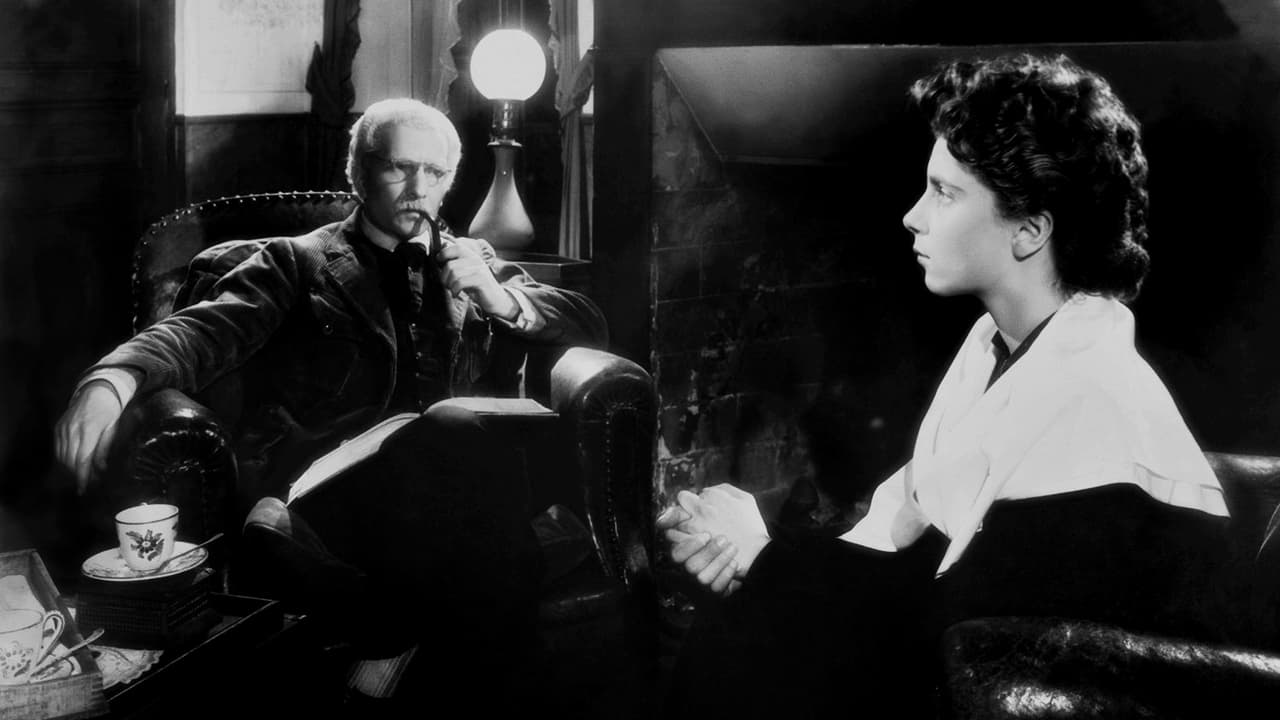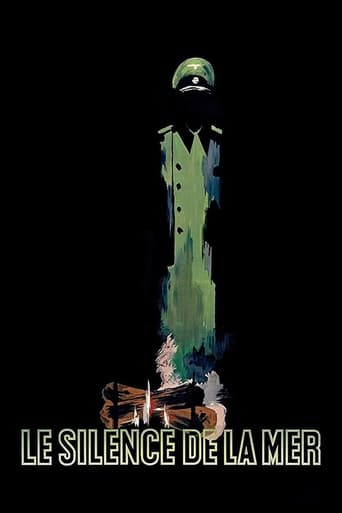



People are voting emotionally.
Highly Overrated But Still Good
It is an exhilarating, distressing, funny and profound film, with one of the more memorable film scores in years,
View MoreClose shines in drama with strong language, adult themes.
View MoreAnd so Jean-Pierre Melville's career began with this very impressive feature debut. While not quite the same kind of film from him as I'm used to (keep in mind the only other Melville films I've seen are Le Deuxième Soufflé and Le Samouraï), it delivers every bit of quiet tension and restrained filmmaking I've come to love from this director. The vast majority of the film is either narration directly out of the book on which the film was adapted, or Howard Vernon delivering hauntingly beautiful monologues. Vernon's performance is flawless and never fails to draw you in. All of this great stuff aside,Le Silence de la Mer has some room to grow. Biggest issue being that it's basically a stage play. The medium is hardly utilized and it makes for a semi- dull viewing. This isn't the fault of Melville or anybody else, that's just what the source material calls for. As perfectly executed as Vernon's monologues were, I just can't help but feel that the story could have had so much more to offer. But this, again, is the fault of the author of the book, not Melville. All in all, Le Silence de la Mer is a very good start to Melville's career and definitely one not to let pass you by.
View MoreEntranced by his sadly near-forgotten 1953 title When You Read This Letter,I was intrigued to find out from a fellow IMDber that DVD company Masters of Cinema had put out a DVD/Blu-Ray of auteur Jean- Pierre Melville's feature debut,which led to me listening to the silence. The plot-France 1941:Wanting to not get too caught up in the Resistance battle against the Nazi Occupation,a man and his grown-up niece try to follow their daily routines. Crushing their will,the Nazi generals order them to take Werner von Ebrennac in as a "guest" who will come home after a long day working for the Führer. Whilst they have no say in him staying there,the man and the woman decide to stage a silent protest against him,which leads to Ebrennac filling the silence by exploring his most intimate feelings on the war and his love of the occupied country.View on the film:Offering an interesting booklet and detailed docs as extras,Masters of Cinema give an amazing transfer,with the audio and the visuals being pin-sharp,whilst retaining the natural grit from the film.Saying just a handful of words over 90 minutes,the alluring Nicole Stéphane gives an incredible performance as the niece, drawing in the most subtle change of facial and body language,from looking down at the floor like a statue,to longing close-ups letting Stéphane crack the ice from the niece's eyes. Bringing attention to detail in his smoke- hued performance, Jean-Marie Robain gives a haunting performance as the uncle,whose low shoulders and endless pipe smoking gives the uncle an unassuming appearance,which Robain cleverly uses to give the uncle's pragmatic mind-set a left-field mood. Holding his head high on the first night in the house, Howard Vernon gives a delicate performance as Ebrennac,whose Nazi uniform Vernon peels away to reveal the thoughtful,considerate man hidden under the beast. Made when feelings on the Occupation were still raw, Jean-Pierre Melville's adaptation of "Vercors" (real name Jean Bruller,who based the story on real events) underground short story delivers a message of understanding the individual,but finely not understanding/reasoning with the enemy. Sitting in silence, Melville takes advantage of the situation by giving the uncle a poetic narration expressing how deep his understanding of Ebrennac goes,and giving Ebrennac a blank canvas,which gets painted with the discovery that all of his optimistic beliefs are fatally wrong. Unafraid to open up feelings on the Occupation, Melville presents the uncle and nieces rebellion in a detached, passive manner,with neither of them looking outside the window for a Hollywood (in terms of heroics) resistance. Going French New Wave almost a decade before the movement existed, Melville went in an indie mode made visible by two non-union cinematographers quitting over his style,the production taking a year due to Melville's cash limits,and most of the movie being shot at Vercors own house. Largely keeping the screen limited to the three in the house, Melville breaks the theatrical trappings of the real location with deep,rich shadows and charcoal (natural) low- lighting casting a ghostly atmosphere over the title. Making his debut, Melville displays signs of the auteur vision that was to arrive with beautiful close-ups capturing the moment when the restrained emotion silently pours out.
View MoreIn a small town in occupied France in 1941, the German officer, Werner Von Ebrennac (Howard Vernon) is billeted in the house of the uncle and his niece. The uncle and niece refuse to speak to him, but each evening the officer warms himself by the fire and talks of his country, his music, and his idealistic views of the relationship between France and Germany.I am not terribly familiar with the work of Melville. More or less, beyond "Le Samourai", I know practically nothing about the man and his work. And, after seeing this, I will have to say "Samourai" is the better film, though this is not without its merits and quite decent for its humble origins.Of particular interest to me was the casting of Howard Vernon, who was only known to me from the films of Jess Franco. Seeing him in something else, especially something so serious, makes me see he is a better actor than the films he is associated with. What went wrong, Howard?
View MoreThis film is famous for several reasons, all of them valid. The film is based upon a novel by Jean Marcel Bruller (1902-1991), writing under the pen name of 'Vercors'. The novel appeared in 1942 and was circulated secretly throughout France by the Resistance, at great danger to the lives of all concerned, under the noses of the occupying Nazis, and it became a classic work of defiance of the oppressor. Jean-Pierre Melville, who had never made a film and did not even know how, decided after the War that he had to film this story. He completed the film in 1946 and it was finally released in 1949. He shot the film in the novelist's own house for the sake of authenticity. It was half-financed by Nicole Stéphane (1923-2007), later an actress, whose first film appearance this was, as the niece. She was apparently related to the Rothschilds and thus part Jewish. She later acted in six further films, including Melville's film of Jean Cocteau's LES ENFANTS TERRIBLE (1950) and she played Marie Curie in MONSIEUR ET MADAME CURIE (1956), retiring as an actress in 1958. After that, she was producer of six films, commencing with the famous and politically provocative MOURIR À MADRID (1963) and ending with a TV film in 1988. In this film, she speaks only four words, despite being a leading player, but her performance is superb nevertheless. The story concerns the enforced billeting of a German army officer in 1942 in the country house of an elderly man (played by Jean-Marie Robain, puffing imperturbably on a pipe) and his young niece (Stéphane). They adopt an attitude of passive resistance, by never speaking to the German officer. Perhaps the most amazing thing about the film is the truly remarkable performance of Howard Vernon as the officer. The story is based upon a real experience in that same house by the author of the novel. The officer is a highly-refined and cultured Francophile, who likes to refer to all the famous French authors, even the Jewish author Proust, with affectionate regard. He sits down at one point and beautifully plays a Prelude by J. S. Bach. All of these scenes take place in the drawing room of the house, where the officer delivers long monologues to his hosts, and to which they never reply. He opens his heart to them and tells them of his deep and abiding love for France and French culture, of his passionate belief that the German Occupation will bring a wonderful and indeed a mystical union between the two cultures. His eyes glow with fervent idealism as he says these things. He explains that he always refused to join the Nazi Party, which is why he is only a Lieutenant in the Wehrmacht instead of a high officer, as he is well into middle age. Vernon's character is based upon a mixture of the real officer who was billeted in the house and the highly-cultured author, Captain Ernst Jünger, who was based in an administrative role in Paris during the Occupation. Jünger (1895-1998) lived to the extraordinary age of 103, and was author of many famous novels such as ON THE MARBLE CLIFFS (1939) and THE GLASS BEES (1957). Forty years after the War, he published a novel about Paris during the Occupation entitled A DANGEROUS ENCOUNTER, which I have read and did not think was particularly successful. His diaries of the period in Paris are also published as GARDENS AND STREETS (1942, never translated into English). During his time in Paris, the intensely Francophile and anti-Nazi (though otherwise very right-wing) Jünger fraternized with people such as Jean Cocteau. Jünger and the officer billeted with Vercors were both idealistic and old-fashioned conservative officers of the regular German Army, known as the Wehrmacht, who tended to be highly cultured and not in sympathy with the lowbrow Nazis, whom they often despised. It was these people, such as my own distant cousin James von Moltke (executed by the Nazis), who plotted against Hitler and tried to assassinate him. The performance of Vernon shows the officer displaying the most perfect and impeccable manners, bowing to his hosts and wishing them good night and confiding in them with almost reckless abandon about his hopes and fears. They never respond until the end of the film. He even tells them he admires them and understands their behaviour. But the turning point of the story comes when he visits Paris, which he has longed to do all his life. After seeing the famous monuments and soaking in the incomparable atmosphere of the world's most wonderful capital city, he then pays a visit to his childhood friend at a headquarters office where he is serving as an SS officer. As we all know, or should know, the Wehrmacht was one thing, but the SS was quite another. He is utterly horrified to learn of an extermination camp called Treblinka. (This mention of Treblinka, actually chronologically impossible for him to have learned about in 1942, was inserted into the script by Melville, who was Jewish, and did not appear in the novel.) The discussion of Treblinka occurs in German, and in the original French release of the film, it was not translated by any French subtitles. Vernon's SS friend then goes on to boast about how the Nazis intend to destroy French culture root and branch, as decadent and un-German. This totally shatters Vernon and destroys all his idealistic illusions about his role. He returns to the house in the country and tells his hosts of this terrible experience and these monstrous revelations, hoping for some glimmer of sympathy from them at his disillusionment and the horror of what he has learned. But they just look at him silently. The DVD contains an interview by cinéaste Ginette Vincendeau, as well as a lengthy printed booklet by her.
View More